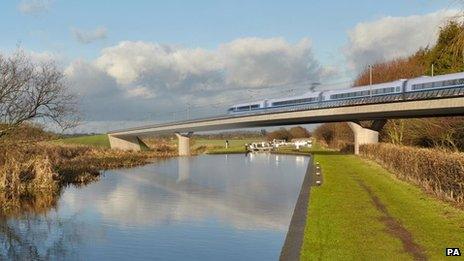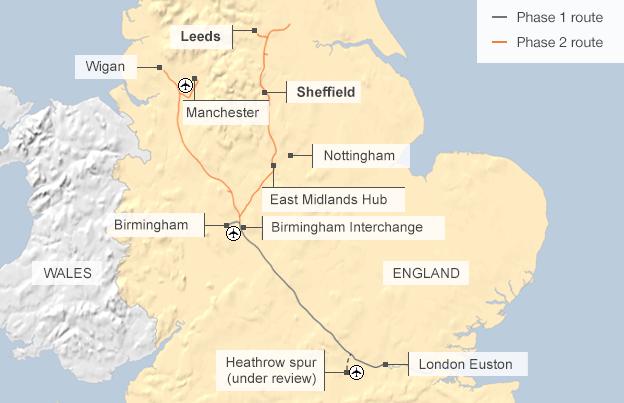HS2 legal bid rejected by Supreme Court
- Published

Objectors included the HS2 Action Alliance, Heathrow Hub campaigners and local councils
The Supreme Court has rejected a legal bid by objectors to the HS2 high-speed rail link to force further scrutiny of the government's plans.
The challenge had focused on whether the government followed the rules when assessing HS2's environmental impact.
But the court unanimously rejected the claims against the scheme.
The BBC understands this is now the end of the first stage of the legal challenges, as there is no right of appeal to Europe.
But there could be future challenges on the second phase of the scheme - beyond Birmingham - when the exact route is announced.
'Crucial business'
The £50bn project is intended to allow trains to run at 225 mph (362km/h) from London to Birmingham from 2026, with branches to Manchester and to Leeds via Sheffield - planned by 2032.
Objectors to the project have said the scheme will cause an unacceptable level of environmental damage, loss of homes and disruption to many communities.
Responding to the ruling, transport minister Baroness Kramer said the government's handling of the project had been "fully vindicated", particularly as the appeal had addressed technical issues that had "no bearing" on the need for the new link.
"The new north-south line will provide extra space for more trains and more passengers to travel on the network, delivering additional capacity where it is most needed," she said.
"HS2 will also generate thousands of jobs across the UK and provide opportunities to boost skills."
Baroness Kramer said ministers would now continue with the "crucial business" of getting the scheme ready for construction in 2017.
The legal challenge was made by a number of objectors, including the HS2 Action Alliance (HS2AA), Heathrow Hub campaigners and local councils along the proposed route.
David Elvin QC, appearing for HS2AA, told the Supreme Court at a hearing in October that the case concerned "the most important strategic rail decision this country has taken at least for a generation".
Mr Elvin said the government had failed to consult as widely as it had promised and to consider alternatives to its preferred scheme, urging the judges to overturn an Appeal Court majority upholding the project.
However, on Wednesday the court rejected his application for a declaration that government transport chiefs had breached an EU directive by failing to carry out a strategic environmental assessment (SEA).

The seven judges also dismissed a further challenge brought by local councils - led by the London Borough of Hillingdon - citing a second EU directive, the Environmental Impact Assessment Directive (EIAD).
'Legal obligations'
Following the ruling, HS2AA campaign director Emma Crane said: "We are very disappointed, but it is absolutely not the end of the road. We believe this is a wrong decision."
She added that ministers were "effectively sidestepping their obligations" and the group would be making "a complaint to the European Commission to say the UK government has not complied with its European law obligations on the environment".
"We are speaking to our lawyers," she said.
Meanwhile, the government has agreed to give opponents of HS2 more time to respond to the environmental statement accompanying the project, after 877 pages were left out of the original document by mistake.
The deadline to respond is now February 27, an extra 17 days, following a House of Lords committee ruling earlier this week.
The deadline had been extended by 17 days last week after a Commons committee made a similar ruling.
It could mean a delay to the first big debate on the government's main HS2 bill.
- Published18 January 2014
- Published17 January 2014
- Published15 January 2014